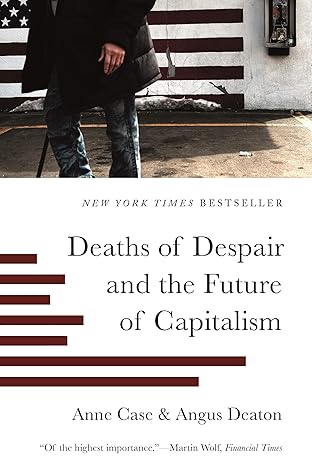More on this book
Community
Kindle Notes & Highlights
by
Anne Case
Read between
August 24 - August 27, 2021
the American healthcare system is a leading example of an institution that, under political protection, redistributes income upward to hospitals, physicians, device makers, and pharmaceutical companies while delivering among the worst health outcomes of any rich country.
Rentseeking is a major cause of wage stagnation among working-class Americans and has had much to do with deaths of despair.
Eating too much, like drinking too much, is for some people a reaction to stress and a way of self-soothing in the face of life’s difficulties and disappointments, so deaths associated with obesity could perhaps also be included as deaths of despair.
Emile Durkheim argued that to understand suicide—and the same could be argued for other deaths of despair—we must look beyond the individual to society, particularly to breakdown and turmoil in a society that can no longer provide its members an environment in which they can live a meaningful life.
Addiction, it is often said, is a prison where the locks are on the inside, but that makes escape no easier.
The opioid story shows the power of money to prevent politics from protecting ordinary citizens, even against death.
After the crash, when so many ordinary people lost so much, including their jobs and their homes, the bankers continued to be rewarded and went unpunished, and politicians continued to protect them. Capitalism began to look more like a racket for redistributing upward than an engine of general prosperity.
among the strongest advocates that the poor should work more are the idle rich, who have never done any.
there are now two different modes of transitioning to adulthood. One, among the more educated, involves finishing college, taking a job, and developing a career before marrying and having children. The other, among the less educated, involves serial cohabitation and childbearing out of wedlock.
For both men and women, the old social rules—restrictive and unforgiving although they might have been—encapsulated long-accreted social wisdom that prevented people from making lifetime decisions that they might well live to regret.
much more important for despair is the decline of family, community, and religion. These declines may not have happened without the decline in wages and in the quality of jobs that made traditional working-class life possible.
Doctors numbers are held down by limiting the number of places in medical schools, at the behest of doctors’ groups and Congress, and by making it difficult for foreign doctors to practice in the US.
patients’ best interests are not always aligned with those of drug companies, so they might reasonably want to know just who their doctors are working for, and to be reassured that their hospital is not just a wing of a pharma company.
large parts of the American economy have been captured to serve the wealthy with the consent and connivance of government.
If you cannot afford to lobby, you are not represented, and worse, in the oft-used but accurate Washington phrase, if you do not have a seat at the table, you are probably on the menu.
we are not disturbed by inequality in and of itself, but very concerned with the inequality that comes about through theft and rent-seeking, or through the involuntary upward redistribution
The K–12 educational system is largely designed to prepare people to go to college, although only a third succeed in doing so, something that is both wasteful and unjust.
Our story of American distress is that, at a time when working people were increasingly vulnerable to automation and trade, politicians and corporations, instead of working to cushion the harm, seized the chance to benefit themselves, redistributing upward from labor to managers and shareholders.
we hope that the sheer awfulness of the epidemic of deaths, as well as the extremes of inequality that have been generated by rentseeking and upward redistribution, will generate an opportunity where schemes that have been long thought about might be put into place.


